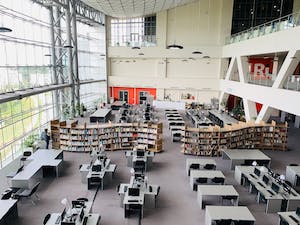Introduction

University of Development Studies is an idea implemented practically in Ghana. The University of Development Studies (UDS) is a renowned institution in Ghana, known for its commitment to transforming lives through education and community development. With campuses strategically situated in the Northern Region, UDS aims to deliver quality education to its students, while simultaneously addressing the development challenges faced by the country. Through its various programs and initiatives, UDS has played a significant role in improving the lives of individuals and communities across Ghana.
One of the key aspects that sets UDS apart is its strong emphasis on practical and community-based learning. The university recognizes the importance of hands-on experience in fostering skills and competencies among its students. Therefore, UDS actively engages students in fieldwork, research, and internships, allowing them to apply their knowledge in real-world scenarios. This approach equips students with the necessary tools and experiences to tackle the developmental challenges faced by Ghana and beyond.
In addition to its focus on practical learning, UDS is committed to providing access to quality education for all. The university believes that education is a fundamental right and a catalyst for development. Consequently, it has implemented various programs to ensure that individuals from marginalized communities have equal opportunities to pursue higher education. This inclusiveness has enabled UDS to nurture a diverse and vibrant student population, fostering cultural exchange and mutual understanding.
Furthermore, UDS has established strong linkages and collaborations with local and international institutions, governments, and organizations. These partnerships enable UDS to leverage expertise, resources, and knowledge to address complex development issues. By working collaboratively, UDS can implement sustainable and impactful solutions, thereby positively impacting the lives of individuals and communities.

UDS also prioritizes research and innovation as key drivers of development. Faculty members and students are encouraged to engage in cutting-edge research, with a particular focus on solving local and global challenges. Through its research activities, UDS has made significant contributions to various sectors, including agriculture, health, environment, and social development. These research outputs have not only shaped policies and practices but have also provided solutions that have improved the lives of countless individuals.
Moreover, UDS places great importance on community engagement and social responsibility. The university recognizes that development is a collective effort, involving all stakeholders. Hence, UDS actively involves community members in the decision-making processes of various projects and initiatives. This participatory approach ensures that development interventions are contextually relevant, sustainable, and truly empowering.
The university also seeks to instill a sense of social responsibility among its students by encouraging volunteerism and community service. Through various outreach programs, students are exposed to the realities of marginalized communities and are encouraged to contribute their skills and knowledge to address pressing issues. This engagement not only transforms the lives of those being served but also leaves a lasting impact on the lives of the student volunteers.
Additionally, UDS has a strong commitment to fostering entrepreneurship and innovation. The university recognizes that traditional employment opportunities may be limited, and therefore encourages students to be creative and proactive in developing their own businesses and ventures. UDS provides the necessary support and resources to aspiring entrepreneurs, enabling them to launch successful enterprises that contribute to local economic development and job creation.
UDS also places a strong emphasis on gender equality and women’s empowerment. The university actively promotes the enrollment and participation of women in its programs and initiatives. Furthermore, UDS has initiated various programs to address gender-based discrimination and violence, promoting a safe and inclusive environment for all.

Universities Contribute to Economic Development in Africa
University of Development Studies – Universities play a crucial role in contributing to economic development in Africa. Through their educational programs, research initiatives, entrepreneurial activities, and collaborations with industries, universities serve as catalysts for economic growth and sustainable development. In this essay, we will discuss how universities contribute to economic development in Africa, focusing on their role in producing a skilled workforce, fostering innovation and technological advancements, stimulating entrepreneurship, and promoting academic-industry collaborations.
Firstly, universities in Africa play a vital role in producing a skilled workforce that meets the demands of the evolving labor market. Through their diverse academic programs, universities equip students with the necessary knowledge, technical skills, and critical thinking abilities. This workforce, in turn, drives economic growth in various sectors, such as engineering, technology, healthcare, agriculture, and business, leading to increased productivity and competitiveness.
Secondly, universities contribute to economic development by fostering innovation and technological advancements. They serve as hubs for research and development, where scholars and scientists engage in groundbreaking research to address Africa’s unique challenges. Universities foster an environment conducive to innovation, providing researchers with access to state-of-the-art laboratories, funding, and collaboration opportunities. This research often leads to discoveries that have practical applications and contribute to the development of new industries, job creation, and economic diversification.
Moreover, universities serve as incubators for entrepreneurship and innovation. Many universities have established entrepreneurship centers and business incubators that support students, alumni, and faculty in starting their own ventures. These initiatives provide mentorship, training, access to networks, and funding opportunities, enabling aspiring entrepreneurs to transform their ideas into successful businesses. By nurturing a culture of entrepreneurship, universities contribute to job creation, increase in tax revenue, and overall economic growth.
Furthermore, universities in Africa play a vital role in promoting academic-industry collaborations. They partner with private sector enterprises, government agencies, and non-profit organizations to conduct research, develop technologies, and find solutions to societal challenges. These collaborations facilitate knowledge transfer, commercialization of research findings, entrepreneurship, and the creation of industry-academia partnerships. This interaction between academia and industry promotes innovation, improves productivity, and enhances competitiveness, thereby contributing to economic development.
In addition to these direct contributions, universities also have a significant indirect impact on economic development. They attract international students, researchers, and faculty, fostering cultural exchange and creating a thriving international academic community. This internationalization of universities enhances cross-cultural understanding, strengthens diplomatic ties, and encourages knowledge sharing, which in turn contributes to economic integration and building global partnerships.
Furthermore, universities act as think tanks and policy advisors, providing evidence-based research and expertise to inform policymaking processes. Their involvement in shaping national and regional policies contributes to the creation of favorable business environments, investment attractiveness, and policy instruments that promote economic development. Universities also support capacity building initiatives through training programs, workshops, and knowledge dissemination, which enhances the competencies of individuals and institutions, fostering sustained economic development.
Universities play a multifaceted role in contributing to economic development in Africa. Through their provision of a skilled workforce, fostering innovation, stimulating entrepreneurship, promoting academic-industry collaborations, and indirect contributions such as internationalization and policy advising, universities serve as engines for economic growth and sustainable development. Recognizing the importance of higher education in driving economic transformation, African governments and stakeholders should continue to invest in universities and establish supportive policies that enable them to fulfill their potential as key contributors to economic development.

Universities Contribute to Economic Development in States
Universities play a significant role in fostering economic development within states. These higher education institutions contribute to economic growth by producing skilled graduates, promoting research and innovation, attracting investment, supporting entrepreneurship, and building strong partnerships with industries. This essay aims to explore these different ways in which universities contribute to the economic development of states.
One of the primary ways universities contribute to economic development is by producing a highly skilled workforce. Through their diverse and comprehensive curriculum, universities equip students with the knowledge and expertise needed to excel in various industries. Graduates from universities are well-prepared to meet the demands of the job market and become valuable contributors to the state’s economy.
Moreover, universities are at the forefront of research and innovation. They conduct cutting-edge research in various fields, which leads to new discoveries, technologies, and inventions. This research plays a vital role in driving economic growth as it leads to the development of new products, services, and industries. Successful commercialization of these innovations can contribute significantly to the state’s economy.
Universities also attract investment to states. Research and development activities conducted at universities often attract funding from both public and private sources. These investments not only support university research but also stimulate economic activity in surrounding areas. The presence of a prestigious university in a state can also attract businesses, entrepreneurs, and investors who seek to collaborate with the institution, resulting in job creation and economic growth.
Furthermore, universities are crucial in fostering entrepreneurship. Many universities have programs and initiatives that support students and faculty in starting their businesses. These programs provide mentoring, funding, and access to resources, fostering a culture of entrepreneurship. Many successful startups and small businesses are born out of universities, contributing to job creation, innovation, and economic development within the state.
Universities also help build strong partnerships with industries. Collaborative research projects, internships, and co-op programs establish connections between students, faculty, and industries. These partnerships enable students to gain real-world experience and develop industry-specific skills, bridging the gap between academia and the job market. Additionally, universities collaborate with industries on research projects, leading to mutual benefits such as product development and knowledge sharing.
In addition to these direct contributions, universities also have an indirect impact on the state’s economy. The presence of universities attracts students from other states and countries, who contribute to the local economy through their spending on housing, transportation, and other goods and services. The universities themselves often employ a significant number of faculty and staff who support local businesses and contribute to the tax base.

Furthermore, universities serve as cultural and intellectual hubs within states. They host various events, conferences, and cultural programs that attract visitors from outside the state. These visitors spend money on accommodations, dining, and shopping, leading to an economic boost for local businesses.
Additionally, universities also contribute to regional development by nurturing local talent. They provide educational opportunities to students who might not have the means or resources to pursue higher education elsewhere. By doing so, universities promote social and economic mobility within the state, fostering a more inclusive and prosperous society.
Universities make significant contributions to economic development within states. They produce highly skilled graduates, promote research and innovation, attract investment, support entrepreneurship, build strong industry partnerships, and have indirect impacts on the local economy. By recognizing and investing in the potential of their universities, states can harness the power of higher education institutions in driving economic growth, creating jobs, and fostering innovation for the benefit of their citizens.

Conclusion on University of Developmental Studies
In conclusion, the University of Developmental Studies is a transformative institution that is dedicated to changing lives through education and community development. Through its practical learning approach, commitment to inclusivity, strong partnerships, research contributions, community engagement, social responsibility, fostering entrepreneurship, and focus on gender equality, UDS has proven its effectiveness in creating positive change. As Ghana continues on its developmental journey, UDS will undoubtedly play a crucial role in shaping the future of individuals and communities, ultimately contributing to the overall progress of the nation.
